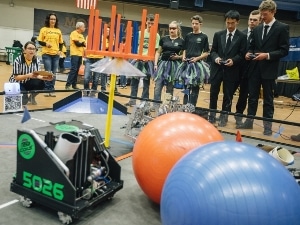Jan 30 2017
When the Redneck Robotics team from Sun River turned their robot loose in Montana State University’s Shroyer Gym on Friday, it homed in on blue lights lining the playing field’s edge, deftly extended an arm and hit a button, racking up points right away.
 Middle school and high school students participate in the FIRST Tech Challenge robotics competition in Shroyer Gym at Montana State University on Friday, Jan. 27, 2017 in Bozeman, Mont. Students from across Montana flock to MSU for the annual robotics competition hosted by the MSU College of Engineering. MSU Photo by Adrian Sanchez-Gonzalez (Credit: Montana State University)
Middle school and high school students participate in the FIRST Tech Challenge robotics competition in Shroyer Gym at Montana State University on Friday, Jan. 27, 2017 in Bozeman, Mont. Students from across Montana flock to MSU for the annual robotics competition hosted by the MSU College of Engineering. MSU Photo by Adrian Sanchez-Gonzalez (Credit: Montana State University)
"That was amazing," said Douglas MacLeod, a volunteer at the event, called the FIRST Tech Challenge. "They pre-programmed all of that."
MacLeod, a freshman majoring in computer engineering at MSU’s College of Engineering, which hosted the event, helped tally points as the robots scooped up grapefruit-sized balls and launched them through color-coded hoops.
"Endgame! Endgame!" the emcee announced, signaling that the teams had 30 seconds to crane bigger exercise balls into the hoops.
"The competitions are fun and exciting," MacLeod said. "You get to show off your computer programming and the hardware that you've made."
For MacLeod, volunteering at the event completed a circle that began when he participated in FIRST while a high school student in Belgrade.
"I like to build things and make them come to life, and FIRST was my introduction to that," MacLeod said. "It's what really got me into computer programming, which is what I love to do now."
MacLeod's story is one that electrical and computer engineering department head Rob Maher hears often. He estimated that hundreds of FIRST alumni have ended up in MSU’s engineering programs.
"I think there are a number of them who wouldn't have otherwise realized that this is something that they really love," he said.
FIRST (For Inspiration and Recognition of Science and Technology) is a Manchester, New Hampshire-based non-profit organization designed to inspire young people's interest and participation in science and technology. After months of preparation, students around the world participate in robotics competitions like the one that took place at MSU on Friday and will continue on Saturday.
According to Maher, who has volunteered as a FIRST judge since MSU began hosting the event a decade ago, FIRST has helped fill a gap in K-12 education. "Until recently, there really wasn't much awareness of what engineering is about," he said.
"If you ask students who are interested in science and math what they want to be when they grow up, they might say 'scientist,'" he said. "Unless they have an engineer in the family, it's kind of a hidden profession."
MSU’s FIRST competitions draw teams from across the state, including from rural towns such as Fort Benton, Nashua and Sun River, whose team won a world championship in 2015 at the FIRST Tech Challenge, in which students grades 7-12 compete using complex robots that they have designed and built.
Haley Ketteler of Pierre, South Dakota, came to MSU to major in mechanical engineering after participating in FIRST throughout middle and high school. "I didn't even know what an engineer was before FIRST," she said.
Maggie Kerr of Helena High School, wearing a red cape emblazoned with her team’s name, "Fusion," plans to study computer science at MSU starting this fall. "I really like the comradery," she said of FIRST. "It’s been a great opportunity to see the (MSU) campus," she added.
MSU freshman and computer science major Jordan Pottruff signed up to volunteer at Saturday’s FIRST Lego League event, in which students grades 4-8 build and program animal-themed robots made from Lego kits, and compete by performing "missions" on pool table-sized playing fields. He reflected on the similarity between his computer science studies and his experiences in FIRST Lego League in Great Falls.
"You have to program the robot," he said. "You have to tell it how far to go, when to turn, how far to turn. It's basically the same thing that I'm doing now" as a computer science student, he said.
For Dorcella Plain Bull, a FIRST coach and 4th grade teacher in Wyola, attending FIRST during the past three years has provided a way for her students to connect with fellow Crow tribal members who are studying engineering at MSU.
"They started talking to them about what they need to do to get into the (MSU engineering) program, about what they're doing, about the different types of engineering." The response from her young students was positive, she said. "They were like, 'we can do that too.'"
Maher, who advises other judges, tries hard to create a positive atmosphere at the event. "This is a competition, but a lot of what we do is encouragement, to celebrate the effort that the students have put in," he said.
"It's very upbeat," he added. "Having bleachers full of parents and friends cheering over a robot competition, as if it were a basketball game, it’s really unique."
MacLeod can relate. He remembered when his team came to MSU for FIRST, and his team’s robot was stumbling from a malfunction. A volunteer approached and helped them solve the problem.
"I wanted to be that person this year," he said. "I can't do the competition anymore, but I wanted to be right up front and watch the robots, and to help out."